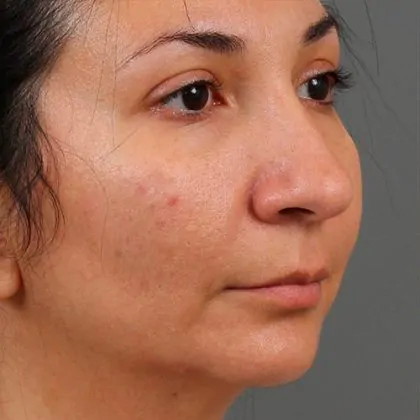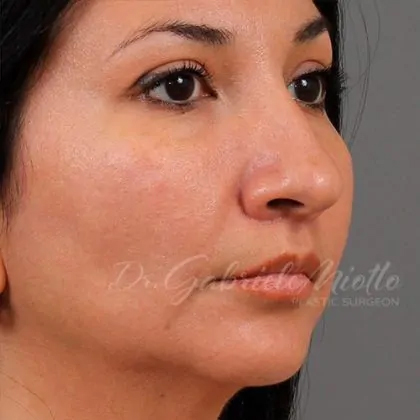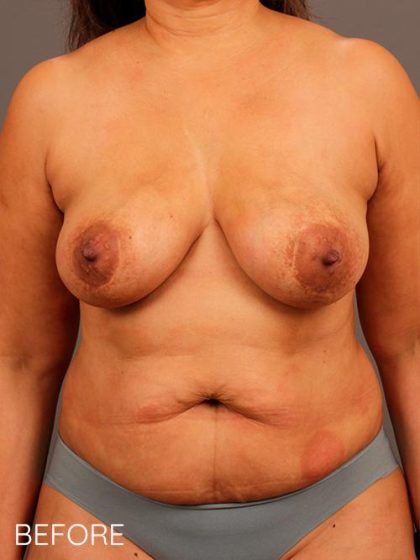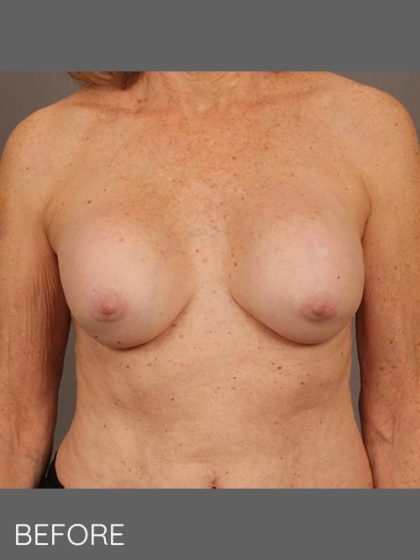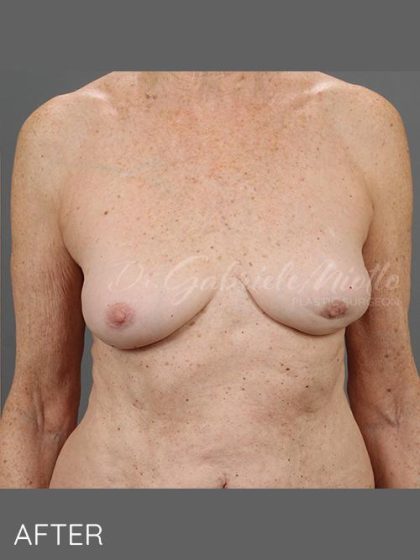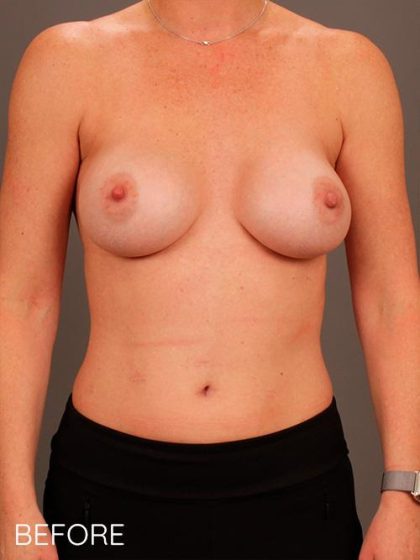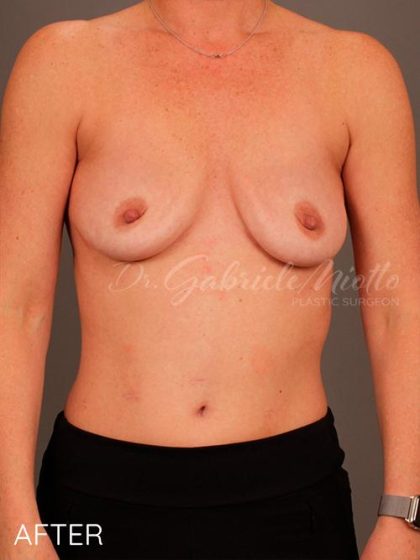Breast Implant Removal
Conveniently located to serve the areas of Atlanta, GA
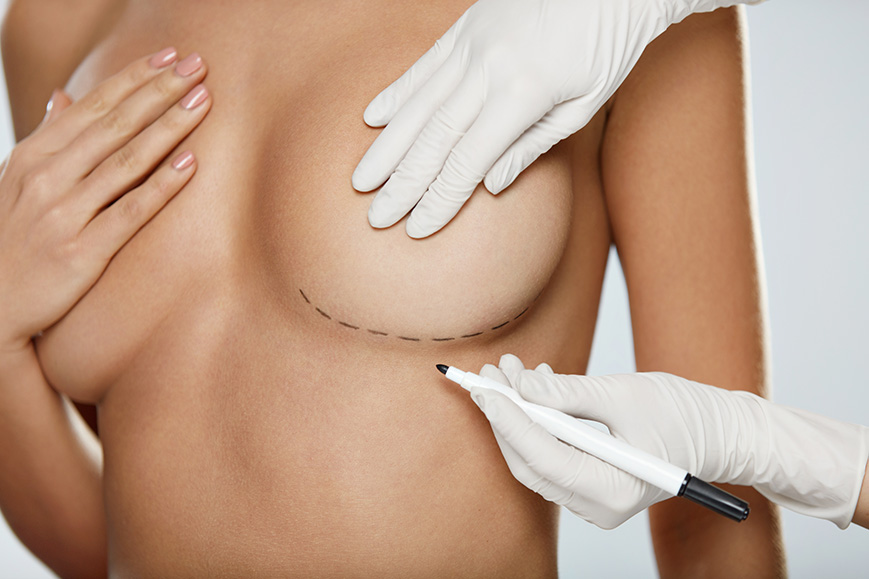
Patients who have breast implants may seek permanent breast implant removal to downsize the breasts without any other surgeries. Many patients feel they have enjoyed having implants, but no longer want them, and no longer want to keep replacing them.
Contents
- 1 Before and After Photos
- 2 After procedure
- 3 General preoperative recommendations
- 4 General postoperative recommendations
- 5 Activity
- 6 Bathing
- 7 Returning to work
- 8 Diet
- 9 Final results
- 10 FAQ
- 10.1 What is breast implant removal?
- 10.2 What is implant removal and a breast lift at the same time?
- 10.3 How is a breast implant removal surgery performed?
- 10.4 Do I need to be sedated during breast implant removal?
- 10.5 Will my breasts sag after implants are removed?
- 10.6 Will there be a visible implant removal scar after surgery?
- 10.7 Will there be swelling after implant removal surgery?
- 10.8 What is breast implant removal recovery time?
- 10.9 Am I a good candidate for implant removal?
- 10.10 What is the breast implant removal cost?
- 10.11 How can I get started to learn more?
Before and After Photos
After procedure
Breast implant removal is an outpatient surgery done under general or local anesthesia (in selected cases). After the procedure, there will be visible fine skin sutures in the incisions, some bruising and swelling.
Breast implant removal is not a painful procedure, but mild discomfort are expected for a few days to a few weeks after surgery. Bruising and swelling are usually the cause of the discomfort. However, it can be treated with preoperative and postoperative medication and supplementation, ice and anti-inflammatories. Swelling can be minimal or more intense depending on how many procedures need to be done in surgery to make the results the most beautiful and natural possible
Sutures are usually absorbable and do not need to be removed after the surgery. Return to normal daily activities between 2-3 weeks. Expect at least 6 weeks for committing to major social events as residual swelling can remain for some patients after surgery. We are all different, so it is hard to predict who will get more or less swelling and bruising.
General preoperative recommendations
What to avoid before surgery
- DO NOT take any aspirin for 7-10 days before your scheduled procedure. Do not take NSAIDS (Aleve, Motrin, Ibuprofen) for 5 days before surgery. You may take Tylenol (Acetaminophen) if needed for aches or pains. Please contact the office at if you have any questions about any medications that you are taking or if you are prescribed aspirin by your cardiologist or Primary Care Provider (PCP).
- Discontinue Vitamin E 10 days before surgery.
- Avoid the following herbal supplements for 10 days before surgery: Echinacea, Ephedra / Phentermine (used for weight loss), Feverfew, Fish Oils, Garlic, Ginkgo Biloba, Goldenseal, Kava-Kava, Licorice, Saw Palmetto, St. John’s Wort and Valerian.
- Stop Smoking. The harmful effects of smoking can cause tissue death, infection, and open wounds. It also makes you age faster!
- Alcohol can promote swelling of the surgical area and it is best to avoid alcohol intake for at least one week before surgery.
What to take before surgery
- Dr Miotto will instruct you to begin using supplements and medications to speed up healing once you come in for your preoperative visit.
General postoperative recommendations
- You MUST have a responsible adult to transport you home and stay with you for a full twenty-four hours after your surgery after general anesthesia
- You will be unable to drive if you are taking narcotics.
- It is common to feel sluggish for a few days as the anesthesia works its way out of your system.
- Your initial post-operative appointment will be scheduled by your Patient Care Coordinator.
Activity
- For your safety, we require that you have a responsible adult stay with you for twenty-four hours after your surgery for general help, as you may find your balance and judgement impaired.
- Please refrain from physical activity that will increase your heart rate or blood pressure for 2 weeks after surgery. However, bed rest is NOT recommended, and you should be walking at normal pace after the procedure.
- Frequent walking will decrease the risk of post-operative blood clots (mostly after general anesthesia).
- Sexual activity can safely be resumed 2 weeks following surgery. Please discuss with Dr Miotto as needed.
Bathing
- You can shower twenty-four hours after surgery. Incisions will be taped and should keep untouched until your follow-up visit.
- Do not submerge yourself into a tub/pool until all wounds have healed (usually in 3 weeks).
- Do not scrub the surgical sites, however you can allow soapy water to run over them.
- Avoid lotions on the surgical sites for 2 weeks, but you can moisturize any other areas as desired.
Returning to work
- Recovery time will vary; however, most patients return to work within one to 2 weeks after the procedure, within one week you will have a feel for your specific limitations and will be able to determine how comfortable you will be with resuming your daily activities and workload.
Diet
- Immediately following surgery, it is best to eat bland, easily digested food and avoid excess sugar and salt. Healthy proteins (eggs, lean meat, beans, nuts), rice, fruits and cooked vegetables (broccoli, peppers, sweet potatoes) will provide your body with nutrients essential for healing.
- Eat a few bites of food before taking pain medications as these can cause nausea.
- A diet low in sodium will help minimize swelling and water retention.
- Drink plenty of water! Drinking low sugar sports drinks and protein shakes are recommended.
Final results
- Keep in mind that our goal in aesthetic surgery is improvement and not perfection. You will be followed closely after surgery to assure that you heal well and have the best possible results.
- It can take months for the very final results of your surgery be apparent. After 12 weeks, you can expect your results to be mostly permanent. Expect subtle changes in swelling and healing (including the appearance of scarring) to continue to appear for up to twelve months.
- It is important for you to keep open communication with your physician and return for your follow up visits. We will take pre and post pictures along the way and look at the final results together.
Dr. Gabriele C. Miotto is a Brazillian-American plastic surgeon specialized in aesthetic surgery and minimally invasive procedures, specially of the face, eyes, nose, breast and liposuction. Call (404) 850-5851 for your consultation.
FAQ
What is breast implant removal?
Breast implant removal is a common cosmetic surgery procedure to remove silicone gel or saline implants from the breasts of women who no longer want to have implants, or to remove an implant that is no longer functioning (after implant rupture or saline implant deflation). The procedure is performed under general anesthesia. For patients who have saline breast implants, we can deflate the implants in the office (remove the saline) under local anesthesia as a “preview” of the look that will be achieved after a simple breast removal. We usually wait 2-3 weeks to proceed with surgery since the breast skin readapts and the real shape of the native breasts may look to really define the surgical procedure (just implant removal, a removal and a breast lift, or a removal and fat transfer to the breasts)
What is implant removal and a breast lift at the same time?
Many patients choose to have a breast lift at the same time as implant removal. The combination of implant removal and lift helps to decrease sagging or flatness of the breasts. In a breast lift procedure, excess skin is removed and tissues are raised and tightened, lifting the breasts to the desired position without the extra volume from the implants.
Implant removal surgery is done on an outpatient basis.
How is a breast implant removal surgery performed?
Breast implant removal surgery is performed under general anesthesia, but in some cases it can be done under local anesthesia with sedation. The procedure takes about 1-2 hours to complete, depending on the complexity, or the need to perform a capsulectomy at the time of removal (removal of the excess scar tissue around certain implants). We start with incisions at the original implant incision location (at the areola, or under the inframammary fold) and we can simply remove the implants, or we can also proceed with a breast lift for breast reshaping. We close the skin with sutures and with minimal recovery time in the recovery room, the patient can go home.
An implant removal can also be performed at the same time as other procedures of the breast and body such as an implant exchange, a fat transfer to the breast, or a tummy tuck (abdominoplasty), or even other facial procedures.
If you think you are interested in an implant removal, we can meet at my office to discuss the procedure details and the best option for you.
Dr. Gabriele Miotto, Cosmetic and Implant removal Surgeon in Atlanta.
Do I need to be sedated during breast implant removal?
Most of the time, the procedure can be performed under general anesthesia. If we decide to perform it under local anesthesia, we can prescribe light oral sedation. These options are discussed with the patient once the type of procedure is decided on.
Will my breasts sag after implants are removed?
After the implants are removed your breasts will look closer to their original shape. If you had some drooping or flatness beforehand, you may see this again. Performing a breast lift in conjunction with implant removal works very well to raise the position of the breast and reduce sagging. For some patients with little skin excess, the breasts resume a nice shape without extra breast reshaping surgery.
Will there be a visible implant removal scar after surgery?
In general, the incisions should not be noticeable after full healing. The incisions are made at the original breast augmentation incisions (around the areola or under the inframammary fold).
Will there be swelling after implant removal surgery?
Yes, there will be some bruising and swelling after the surgery for about 2-3 weeks.
What is breast implant removal recovery time?
The average downtime is about 2 weeks after the procedure. Some patients have more swelling or bruising than others, so it may take about 3 weeks for the most visible signs of surgery to be gone.
Am I a good candidate for implant removal?
If you are in good health, you may be a good candidate for breast implant removal if you no longer want to have implants, you have experienced a rupture or leak of the implant material, or your breasts feel too large and heavy.
What is the breast implant removal cost?
There are several factors which make up the cost of breast implant removal. It varies depending on the goals of the patient, the complexity of the procedure, and if the surgery includes just a removal, a removal and capsulectomy, or also a breast lift.
How can I get started to learn more?
If you think you are interested in having implant removal, it would be my pleasure to see you in the office for an in-person consultation. We can talk about what you want to achieve, go over the specific areas you are looking to improve and, I will answer any questions you have.
Plastic surgery through a woman’s eye
Dr. Gabriele Miotto, Atlanta plastic surgeon known for her beautiful, natural results and high patient satisfaction.


